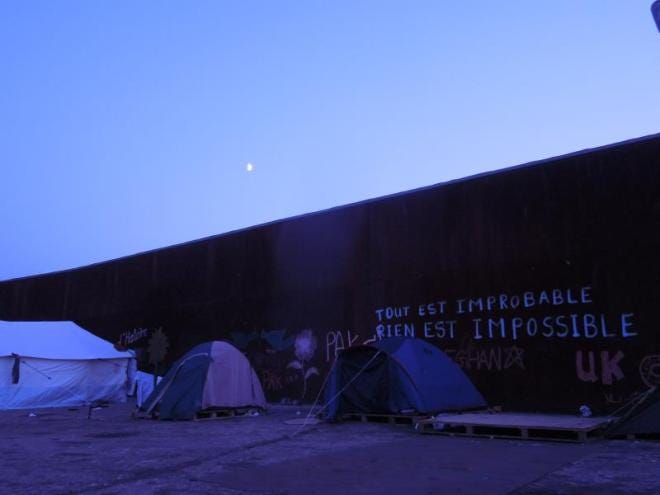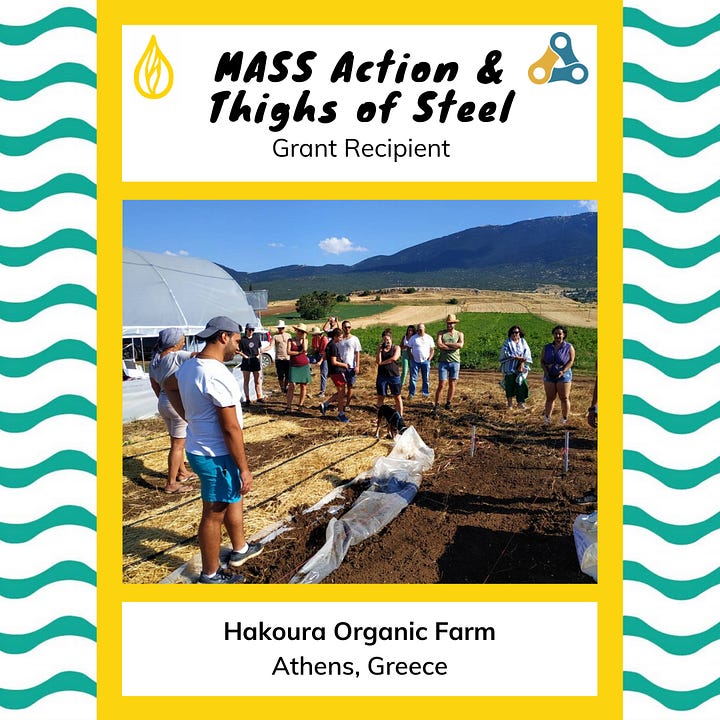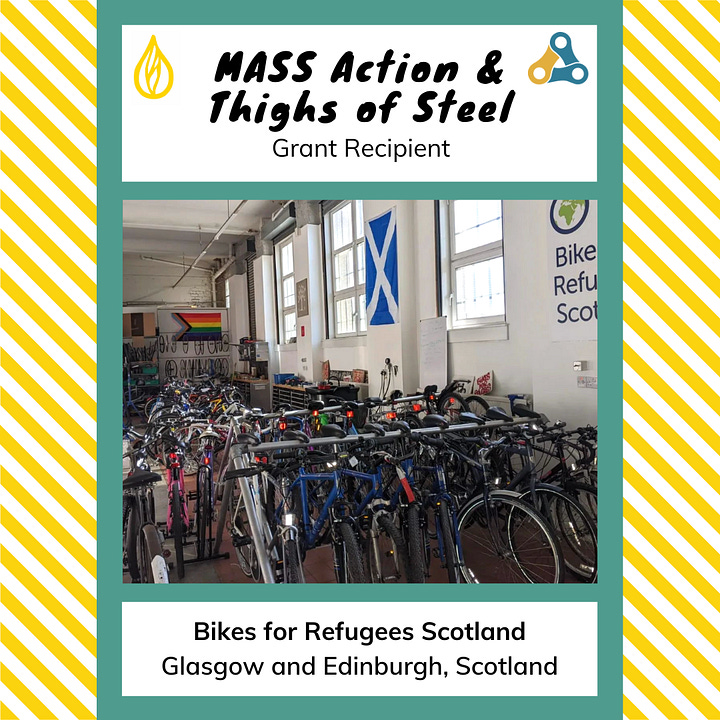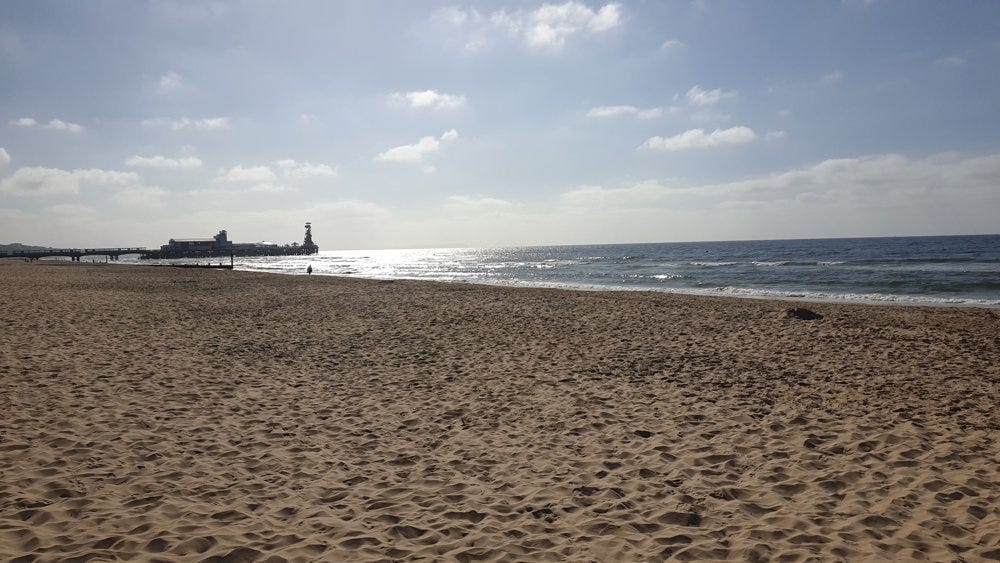10 Years Of No Borders
Teaching English in Calais, skipping food out of bins and staying up all night watching for police raids gave me a new belief system, one with no room for borders of any kind
Happy Friday!
And greetings from the beach.
If you could live in any landscape, where do you think you would most love to be?
Coast, river or lakeside, mountain or valley, woodland, forest or jungle, moorland, wetland, marsh or delta, savanna, desert or icecap, steppe, tundra, plain or prairie, hamlet, village, town, city, megalopolis or wilderness?
Does where you live make a difference to how you feel, what you do and, ultimately, who you are?
I mean, the answer is obviously YES, but how does it play out for you?
Water — sight, sound and even scent — is so significant to human wellbeing that it’s worth asking what, if any, aquatic elements are present in your day-to-day?
Are you where you are because of other factors — yes, probably — but did you know that even staring at a fish tank without fish can reduce your blood pressure, elevate your mood and calm you down?
Or that you can buy a mini water fountain from Argos for £39? Okay, so it’s designed for cats, but who cares, as long as it still makes a fascinatingly relaxing bubbly noise?
For those of you new around these parts, welcome 👋 My name is David and I’m a writer, outdoor instructor and cyclist-at-large with Thighs of Steel. I write stories that help you and me understand the world (and ourselves) a little better.
Sometimes I wonder about where I live.
Welcome to edition 362.
10 Years Of No Borders
Here’s a thing: I’ve been writing about the crisis of borders for ten years.
What’s mad is that my first story on the topic, written after staying in an abandoned chemical factory in Calais, rings as true today as it did then: Do We Need Borders?
The question is, of course, rhetorical.
According to the Oxford English Dictionary, a nation state is: ‘An independent political state formed from a people who share a common national identity (historically, culturally, or ethnically).’
I’m sure you can already see the problems we might run into if, by any chance, those unlucky administrators happened to draw borders in inauspicious places (i.e. almost anywhere).
That 2014 story was written for an audience of your common-or-garden sceptics: the bulk of citizenry who, until now, have never questioned the very fact of our borders and who naturally assume, for amorphous reasons that they’ve never quite pinned down, that controls are necessary.
People like me, in other words.
It’s what I learned in Calais — talking to everyone, teaching some English, skipping fresh food out of supermarket bins, staying up all night on the rooftop watching for police raids — that shoved me into a new belief system, one that has no room for borders of any kind.
In all those ten years of listening, watching and writing, I’ve not come across a better argument to change people’s minds than the simple fact of being there.
William James, the founder of modern psychology, said that we become what we do. […] One trip to Calais, one cup of hot sugary tea with a Sudanese or Eritrean, is worth a full year of media stories, with their distortions, omissions, angles, exaggerations and outright lies.
If I can’t convince you to engage kinaesthetically, then the most disarming argument I’ve found, especially for all those sensible right-thinking folk, is the economic argument: free movement and open borders is ‘the efficient, egalitarian, libertarian, utilitarian way to double world GDP’.
These are not my words, but the general consensus of multiple economic studies conducted over the course of decades.
‘Impossible,’ all those sensible right-thinking folk say.
Not impossible, I say, only improbable. And everything, in this unlikely universe, is improbable so that’s not saying much.

Well, come on then, Mr 10 Years — what’s changed?
I was thinking about my long involvement with the free movement, er, movement because I’m currently reading Daniel Trilling’s excellent book Lights In The Distance: Exile And Refuge At The Borders Of Europe.
I met Daniel on my first 2014 trip to Calais, while he was researching this very book.
He wanted to visit the abandoned tioxide chemical factory where I was staying with half a dozen No Borders activists and several hundred other people, many from Sudan, but with representatives from all over — Egypt, Morocco, Nigeria, Afghanistan, Pakistan, Albania, Vietnam.
We had a strict no journalists policy, but, for some reason, Daniel was allowed in — if only briefly. I dunno. Maybe because he seemed sound.
I still think he seems sound — and I agree with what he has to say about ‘change’:
Often, journalists like to think that what they’re doing is going to provoke a change. […] The myth we believe is that exposing something we consider unjust is enough to fix it. But it’s usually not. […]
Instead, if there’s anything useful in our work, it’s more like fitting the pieces of a shattered mirror back together […] As writers, we have the luxury of distance. We can step back from a situation, try to untangle the web of cause and effect that surrounds it, and retell it in a way that makes sense.
Not only that: I would add that we also introduce people to new ideas, voices and perspectives. It’s nowhere near as good as being there, but stories are a small beginning and that counts for something.
Oh, and plenty has changed in the past ten years.
Me, for starters.
Bikes x Borders
Since 2018, I’ve been part of Thighs of Steel, a community of cyclists who gather together every summer to ride an incredibly long way and raise funds for grassroots activist and migrant-led projects that either advocate for change or offer dignified ways for people on the move to elevate themselves.
As much as possible, these are sustainable projects that return a little power, independence and autonomy to people who have often been stripped of all three.
These are projects like Khora, a community kitchen and legal advice centre in Athens, Hakoura, a refugee-run eco-farm in Greece, the Bikes For Refugees cycle space in Scotland, and Calais Migrant Solidarity, the No Borders activist centre I first made contact with way back in 2014.




Since 2016, Thighs of Steel have cycled from the UK to Athens five times and raised over £650,000 in cash to help keep community spaces like these open to all.
This year, we’re riding again. Another 5,400km from Glasgow to Athens.
449 donors have aready helped our cyclists raise over £13,000 via our partner charity Mass Action.
⚠️ YES! You too can donate by going along here.
All donations welcome and, if you donate £5 or more, then I’ll send you a postcard from the ride with your very own hectic story about something weird or wonderful that’s happened. ⚠️
Cycling my share of the 5,400km and raising the £500 I’ve committed as part of our £80,000 target — both strike me as totally impossible improbable from where I am now.
But if there’s one thing that being a part of Thighs of Steel has shown me over the years it’s that all this is possible — when we act together.
In fact, with our collective momentum, it’s not only possible, it’s highly likely.
And what’s true of cycling from Glasgow to Athens, what’s true of raising £500 or even £80,000 for solidarity projects, is also true of our ultimate goal: free movement and no borders for all, not only for the privileged few.
If the last thousand years are any guide, slow but dramatic change is not only possible but highly likely.
Days Of Adventure 2023: 26
🟢🟢🟢🟢🟢🟢🟢🟢🟢🟢🟢🟢🟢🟢🟢🟢🟢🟢🟢🟢🟢🟢🟢🟢🟢🟢 What is this?
I’m lucky to spend most of my time living in Bournemouth, which, according to a popular search engine, is famous for tourism, football and its universities.
A deeper dive into the search results reveals that, besides its connections to Mary Shelley, JRR Tolkein, The Beatles, Thomas Hardy and Robert Louis Stevenson, Bournemouth is famous for only having one street.
It’s also famous for boasting not one, not two, not three, not four, not five, not six, not seven, not eight, not nine, not ten, not even twelve or thirteen, but eleven kilometres of sandy beach.
Rather than adventure, this has been a week of nearby nature appreciation. The life-giving pines are what made Bournemouth, but this has rightly been a beach week.
Three Small Big Things At The End
1. The Future Of Literature I: The Oxford Dictionary of African American English
Love this. In the words of Editor-in-Chief, Professor Henry Louis Gates, Jr:
Every speaker of American English borrows heavily from words invented by African Americans, whether they know it or not.
Words with African origins such as ‘ ‘goober’, ‘gumbo’ and ‘okra’ survived the Middle Passage along with our African ancestors.
And words that we take for granted today, such as ‘cool’ and ‘crib,’ ‘hokum’ and ‘diss,’ ‘hip’ and ‘hep,’ ‘bad,’ meaning ‘good,’ and ‘dig,’ meaning ‘to understand’ — these are just a tiny fraction of the words that have come into American English from African American speakers.
And, of course, British English. Cool.
2. Humankind: What we learned from one hundred stories about people stitching the world back together
From the marvellous folks at Future Crunch, who have been on a mission since August 2020 to ‘find one human every week who was making the world a better place’.
Here are the stories and what they have learned, including the very Thighs idea that ‘no one sets out to save the world’:
If they looked for someone with the right capacity to run a chimp sanctuary, I would be in the back of the line.
But if you look for someone who’s prepared to stay for the long haul and try to do something, then probably I would be at the front of the line.
3. The Future Of Literature II: The Future of Writing Is a Lot Like Hip-Hop
Stephen Marche wrote a half decent novella using AI and shares details of his process:
First, I had an elaborate plan for the book. Second, I have deep familiarity with the technology and access to some technologies that others don’t, so I was more aware of the limitations and the possibilities. Finally, and by far most important, I know what good writing looks like.
I know who Sudowrite [one of the AI tools he used] should imitate (and can articulate why), and I know what a polished sentence and a truly finished paragraph are. You need more understanding of literary style, not less.
The closest analogue to this process is hip-hop. To make hip-hop, you don’t need to know how to play the drums, but you do need to be able to reference the entire history of beats and hooks.
Every producer becomes an archive; the greater their knowledge and the more coherent their understanding, the better the resulting work. The creator of meaningful literary AI art will be, in effect, a literary curator.
That’s all for this week.
Thank you for reading and I hope you found something to take away with you.
This newsletter (and the writer behind it 👋) is 100 percent community supported. I don’t take a wage for my writing, only what appreciative readers choose to give me.
Even better —
⚠️ Make your contribution direct to this year’s Thighs of Steel fundraiser ⚠️
If you’d rather I got paid, then it’s easy for you to give what you feel is right:
There’s also a tier where you can pay £50 or more.
Whatever you choose, thank you.
Big love,
dc:



